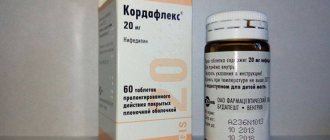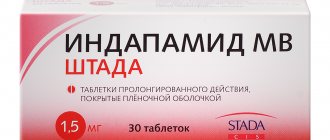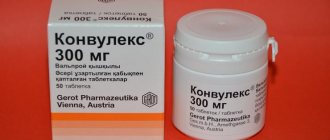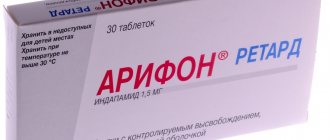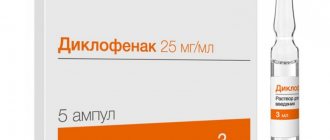General characteristics of the drug
The drug "Corinfar" is an L-type calcium channel blocker. Such channels are localized mainly in cardiomyocytes, sinoauricular node, arterial cells, and myocardium. The drug belongs to the first generation blockers and has a slight negative inotropic effect. It has a short duration of action and has low tissue specificity.
The active ingredient of the drug is nifedipine, a dihydropyride derivative. The active pharmaceutical substance belongs to heterocyclic compounds. It has inotropic, vasodilatory and bronchodilatory properties, and also inhibits platelet aggregation. Excipients:
- Lactose.
- Potato starch.
- MCC (microcrystalline cellulose).
- Povidone K25.
- Salt of magnesium and stearic acid.
The product is available in yellow film-coated tablets. One tablet contains 10 mg of active substance. They are packaged in glass bottles of 50 or 100 pieces.
The drug is over-the-counter and can be purchased at any pharmacy. The average retail price of Corinfar tablets (with instructions for use in the package) is in the range of 70-150 rubles. The medicine can be stored for 5 years without special conditions.
What to replace for hypertension
The following analogues of Corinfar can be purchased in pharmacy chains:
- Osmo-Adult;
- Nifedipine;
- Adalat;
- Nifecard HL;
- Cordipin;
- Nicardia.
Corinfar helps with blood pressure and other symptoms characteristic of hypertension. Despite its high effectiveness, the drug has a wide range of contraindications and possible adverse reactions. To prevent complications, it is important to take the tablets in the correct dosage, recommended by a qualified specialist!
Medicinal action
To understand why Corinfar tablets help, you need to get acquainted with the pharmacology of the drug.
The drug has a hypotensive and antianginal effect. Reduces the flow of extracellular calcium into the muscle cells of the heart, as well as into the smooth muscle cells of blood vessels that deliver blood to the myocardium and peripheral arteries. In large doses, it inhibits the release of calcium from the sarcoplasmic reticulum. In established therapeutic doses, it normalizes the transmembrane calcium current that is disturbed by increased blood pressure and other pathological conditions.
The drug does not affect the contractility of the muscles of the vein walls. Improves blood circulation through myocardial vessels. Enriches the ischemic zones of the affected heart muscle with blood, but the blood flow does not redistribute to neighboring non-ischemic zones. Activates circulation along the side blood flow paths.
By expanding the arteries of the upper and lower extremities, it reduces the total peripheral resistance, myocardial tone and its need for oxygen. It has virtually no effect on the atrioventricular and Keith-Fluck nodes. The drug has weak antiarrhythmic properties.
Increases the volume of blood that passes through the kidneys. Promotes moderate urinary sodium excretion.
In the instructions for use, Corinfar tablets are described as having a high absorption rate. When taken with food, bioavailability increases to 70%. The medicinal effect occurs 20 minutes after application, its duration is from 4 to 6 hours. The drug is excreted by the kidneys in the form of metabolic breakdown products (80%) and with bile (20%).
Pharmacokinetic properties
Corinfar reduces blood pressure within 1-1.5 hours from the moment of taking the tablets. The hypotensive effect of the drug lasts for 6 hours.
The maximum concentration of the active components of the medication in the body is observed 2.5 hours after taking the medication. The therapeutic effect of the drug lasts throughout the day.
In the liver it is transformed into inactive metabolites. It is excreted from the body mainly through the renal apparatus, along with urine. Only about 30% of the drug is excreted through the gastrointestinal tract in the feces.
The half-life of the drug is about 11 hours. However, in patients with pathologies of the renal apparatus, this process takes longer, which is why they require individual dosage adjustment.
Corinfar quickly reduces blood pressure
What are Corinfar tablets prescribed for?
The drug helps to reduce the heart rate of minute and stroke output. It also eliminates and prevents angina attacks and other symptoms of coronary insufficiency.
Based on the pharmacological properties, the doctor determines who to prescribe Corinfar tablets and for what. Their use is indicated for the following pathologies:
- Persistent increase in systolic pressure (above 140/90 mm Hg).
- Hypertensive crisis.
- Prevention of attacks of spontaneous angina that develop as a result of spasm of the coronary arteries (Prinzmetal's angina).
- An autosomal dynamic pathology in which hypertrophy of the left or right (extremely rare) ventricle occurs.
- Angiotrophoneurosis with damage to small aortic arches.
Release form and composition
Corinfar is produced in the form of yellow biconvex tablets coated with film. The active ingredient here is nifedipine. Its content in a tablet is 10 mg.
Corinfar - tablets for high blood pressure
In addition, the composition also includes auxiliary substances such as MCC, povidone K25, lactose monohydrate, magnesium stearate, potato starch. The tablet shell consists of titanium dioxide, yellow quinoline dye, talc, macrogol 3500 and 6000, hypromellose.
In what cases is it contraindicated to take the drug?
In order not to harm the body, it is not enough to know what Corinfar tablets are for. It is also necessary to have an idea for which diseases or pathological conditions the drug is contraindicated.
- Individual hypersensitivity to dihydropyridine derivatives or to other substances included in the drug.
- Persistent decrease in systolic pressure (below 100/60 mmHg).
- A condition in which the cardiovascular system is unable to provide normal blood flow.
- A sharp decrease in blood pressure and deterioration in the blood supply to the body.
- The inability of the cardiovascular system to sufficiently enrich the organs with blood.
- Aortic stenosis.
- A severe period of myocardial ischemia, but not sufficient for the development of myocardial necrosis (unstable angina).
- The first 28 days after myocardial infarction.
- First trimester of pregnancy.
- The period of natural feeding of the child.
- Use of the drug "Rifampicin".
There are also a number of health conditions for which Corinfar should be used with extreme caution, under the supervision of a doctor. This includes:
- Narrowing of the area of the left atrioventricular meatus.
- Primary closed myocardial lesion.
- Tachycardia and bradycardia.
- Sinus node dysfunction.
- Extremely high blood pressure (systole readings from 220 mm Hg).
- Hypovolemia.
- Impaired blood circulation in the vessels of the brain and spinal cord.
- Intestinal obstruction.
- Extrarenal method of blood filtration.
Also, the use of the drug in children under 18 years of age and in women carrying a child is carried out under strict control.
When use is contraindicated
Taking Corinfar for high blood pressure is not recommended for patients with the following clinical contraindications:
- Ileostomy;
- Hypotonic disease (low blood pressure);
- Shock state of cardiogenic nature;
- Myocardial infarction;
- Individual intolerance and hypersensitivity to the components contained in the tablets;
- Unstable angina;
- Colostomy;
- Aortic stenosis.
It is strictly forbidden to take the drug Corinfar during the first trimester of pregnancy, since, penetrating the placental barriers, its active substances negatively affect the formation of the fetus and can even cause dangerous mutations.
At later stages, tablets can be prescribed to expectant mothers only in exceptional cases and in minimal dosages. In this case, therapy should be carried out under strict medical supervision, preferably in a hospital setting, since there is a possibility of stopping the birth process and pulmonary edema.
Corinfar is also contraindicated for mothers during breastfeeding. If treatment with this drug is necessary during lactation, it is recommended that the baby be switched to artificial formula.
Pregnant women and nursing mothers should not take Corinfar
How to take the drug
Since the patient cannot independently assess the severity of pathologies of the cardiovascular system, self-administration of the drug may be associated with a greater health risk. The doctor selects the regimen for each patient individually. For older people, a lower dosage of Corinfar tablets is recommended.
The drug is taken after meals with water. Taking the medicine with food will delay absorption but will not reduce it.
Dosage regimen for angina pectoris. Take one tablet 2-3 times a day. In case of insufficient medicinal effect, the dose may be increased, but not more than forty mg.
The use of Corinfar tablets for high blood pressure (hypertension) follows a similar scheme. When increasing the dose, at least four hours should pass between doses.
The duration of the course is determined by the doctor.
When is the medicine prescribed?
Doctors recommend that users use Corinfar for blood pressure if they have the following clinical indications:
- Arterial hypertension;
- Ischemic disease;
- Angina pectoris (vasospastic, occurring in a chronic form);
- Hypertonic disease.
It can be prescribed for the treatment of diseases and for preventive purposes. Corinfar is used as an independent medication, but can also act as one of the constituent elements of complex therapy for cardiac pathologies.
Side effects
The main difference between first-generation calcium antagonists and the same drugs, but second and third generations, is the large number of side effects.
- The cardiovascular system. There is a rapid heartbeat, swelling of the ankles, legs, arrhythmia, decreased blood pressure without any additional symptoms. As the dose increases, there are occasional cases of attacks of pain in the chest and heart.
- CNS. They may be bothered by noise, headaches, and loss of strength. Asthenia (especially in women) and drowsiness are observed. With prolonged use in maximum doses, numbness of the extremities, tremor of the hands, shuffling gait, loss of coordination, and depression are possible.
- Digestive system. Taking the drug causes mild nausea, stool disturbances, bloating, accompanied by flatulence. When used for more than three months, there is a violation of the circulation of bile, and less often, the growth of gum tissue. The latter goes away quickly after completing the course.
- Musculoskeletal system. The most common side effect is limb cramps, less often - joint swelling and inflammation.
- Hemostasis system. There may be a decrease in platelets and leukocytes in the blood.
- Urinary system: deterioration of kidney function, increase in daily urine volume.
Patients who took Corinfar tablets for blood pressure stated in reviews that it decreased to such an extent that it even darkened their vision. Some note that hives appeared, the skin acquired a yellow tint, as with autoimmune hepatitis.
Side effects and overdose
Adverse reactions after taking Corinfar rarely appear. Most often they occur in people with hypersensitivity to nifedipine.
Possible complications:
- abnormal heart rate, swelling of the lower extremities;
- a sharp decrease in blood pressure;
- fever, redness of the skin;
- increased fatigue, migraine, dizziness;
- The sensitivity of the fingers may temporarily deteriorate, sometimes coordination of movements is impaired, the gait becomes uneven, and problems with swallowing food arise;
- nausea, increased sensitivity of the oral mucosa, bloating;
- anemia, allergic reactions.
With long-term treatment, depression, muscle and joint pain, blurred vision, and weight changes may occur.
If all doctor's recommendations are followed, cases of overdose do not occur. If you take a large dose of the drug on your own, a coma may occur, the pressure drops below the minimum permissible values, and hypoxia develops. If signs of poisoning appear, it is necessary to induce vomiting, rinse the stomach, take activated charcoal and calcium-based medications, and call an ambulance.
special instructions
The drug should be used with caution, without neglecting certain instructions.
- It is necessary to increase the dose, as well as to stop therapy, gradually. It should be taken into account that angina pectoris may occur at the beginning of therapy. The greatest likelihood of its occurrence is provoked by the abolition of previously used beta-blockers. The simultaneous administration of the latter should be carried out under the strict supervision of a physician, so that in the event of an excessive decrease in blood pressure and the manifestation of heart failure, the doctor can immediately take appropriate measures.
- When using the drug, you should avoid taking ethanol, including that contained in medicinal tinctures.
- If angina attacks become more frequent or worsen in patients with severe isolated myocardial damage, the drug should be discontinued.
- If you are undergoing surgery under general anesthesia, you should inform the anesthesiologist that you are taking Corinfar.
- In patients with irreversible kidney disease, high blood pressure, and reduced total blood volume, treatment is carried out with careful observation.
- Corinfar tablets, no matter how well they help, become addictive with prolonged use.
- During treatment, patients must exercise extreme caution when driving.
Instructions for use
The purpose of Corinfar in therapeutic practice is due to the complex effect of the drug on the pathogenesis of cardiovascular diseases.
Pharmacological effects of the drug:
- decreased tone of the smooth muscles of the arterial wall (due to blockade of the flow of calcium ions into the fibers necessary for adequate contraction);
- stabilization of normal heart rhythm, due to the influence on the driver (sinoatrial node) and conduction system;
- improving the filtration capacity of the kidneys by restoring blood flow in the glomeruli;
- moderate diuretic effect;
- lowering blood pressure (antihypertensive effect);
- maintaining the rheological state of the blood (decreasing thromboxane synthesis, slowing platelet aggregation);
- antianginal effect - elimination of pain during angina attacks (due to the restoration of impaired blood flow in the coronary vessels).
The drug is available in tablet form for oral administration. For the convenience of patients, there are options with different dosages of the active substance and release rate (Corinfar Retard).
The drug enters the systemic circulation after absorption in the cavity of the small intestine. The antihypertensive effect develops within 20-30 minutes after consumption and lasts 4-6 hours (for prolonged forms - more than 12). Exchange and transformation of the drug occurs in the liver. Nifedipine is excreted in the form of metabolites in the urine, so Corinfar is not prescribed to patients with decreased filtration function of the kidneys who are on hemodialysis.
Indications
The drug has a wide range of therapeutic effects, so monotherapy with the drug is often prescribed for the treatment of cardiac patients. Indications for use of Corinfar:
- hypertension (essential);
- symptomatic arterial hypertension in pathologies of the kidneys, thyroid and adrenal glands;
- chronic forms of coronary heart disease (CHD): exertional angina, Prinzmetal, diffuse cardiosclerosis;
- hypertrophic cardiomyopathy (with intolerance to beta-blockers);
- heart rhythm disturbances (supraventricular and ventricular extrasystoles, paroxysmal tachycardia);
- Raynaud's disease (angiotrophoneurosis), vascular spasm in the clinic of systemic connective tissue diseases (scleroderma, lupus erythematosus);
- hypertension in the pulmonary circulation (with chronic broncho-obstructive pathologies).
Corinfar during pregnancy is prescribed in the later stages, when the benefit to the mother outweighs the threat to the child. The greatest risk of complications was recorded when taken in the first and second trimester.
Composition, dosage and release forms
In the description of the drug, the active ingredient of Corinfar is Nifedipine, the concentration of which differs in different versions.
The name and dosage of the active component is indicated in the table.
| Tradename | Concentration in 1 tablet |
| "Corinfar" | 10 mg |
| "Corinfar-Retard" (extended action) | 20 mg |
| "Corinfar Uno" (or XL - depending on the manufacturer) | 40 mg |
Auxiliary ingredients that stabilize the active substance and form the tablet form:
- lactose;
- starch;
- magnesium stearate;
- macrogoal
Contraindications
An additional effect on the blood condition, liver and kidney function determines the list of restrictions on the prescription of the medication. Corinfar is not recommended for:
- Previously identified drug intolerance, hypersensitivity to the main and auxiliary components of the drug.
- Allergies to BMCC of the dihydropyridine series.
- Dangerous cardiac pathology: acute coronary syndrome (ACS), cardiogenic shock, myocardial infarction (MI), unstable angina.
- Persons under 18 years of age.
- Women during pregnancy or breastfeeding. The exception is situations when the benefits of taking Corinfar outweigh the possible risks to the fetus. Prescribed by a doctor according to indications and taking into account the medical history and condition of the patient.
- Severe heart defects (congenital or acquired stenosis of the aortic valve, calcification and fusion of the leaflets).
- Hepatobiliary insufficiency due to chronic toxic (alcohol) or viral damage, cirrhosis, malignant neoplasms.
- Decompensated diabetes mellitus.
- Hypotension (blood pressure (BP) less than 90/40 mmHg).
- Circulatory failure with stagnation in the pulmonary circulation (more often with defects of the left side).
- Rhythm disturbances, sick sinus syndrome.
- Patients on hemodialysis with low blood pressure due to hypovolemia (reduced amount of intravascular fluid). Corinfar increases the risk of collapse and orthostatic hypotension.
- For people operating dangerous mechanisms and vehicles: causes retardation, impaired concentration, visual and auditory hallucinations.
The peculiarities of drug metabolism in the liver limit the use of medications for the treatment of concomitant pathologies. Groups of medications prohibited for simultaneous use with Corinfar are presented in the table.
| Group of drugs | Representatives |
| Antibiotics of the macrolide group |
|
| Antifungal agents |
|
| Antiepileptic drugs |
|
| H2 channel blockers |
|
| Tricyclic antidepressants |
|
Adverse reactions
The occurrence of undesirable consequences of taking Corinfar is associated with the body’s adaptation to new conditions: reactions occur in the first 2-3 weeks of treatment.
The main clinical signs are presented in the table.
| Organ system | Symptoms |
| Gastrointestinal tract |
|
| Hepatobiliary system |
|
| Heart and blood vessels |
|
| Blood |
|
| central nervous system |
|
| Allergic reactions |
|
| Endocrine (in patients with diabetes mellitus) |
|
The most rare side effects are visual disturbances and muscle weakness.
In men - decreased potency, reversible erectile dysfunction, gynecomastia (enlargement of the mammary glands), which disappears after discontinuation of the medication.
With a sharp reduction in dosage, there is a risk of “rebound syndrome” - a significant increase in blood pressure. It is not recommended to change the dosage regimen without consulting a doctor.
Alcohol compatibility
Drinking alcohol during treatment with Corinfar is undesirable due to the chemical and biological interaction of alcoholic beverages and Nifedipine.
Pharmacological features:
- ethanol-containing drinks cause dilation of the lumen of the arteries (decrease in vascular tone);
- activation of the parasympathetic division of the autonomic nervous system (decrease in the frequency and strength of heart contractions under the influence of the vagus nerve).
The simultaneous use of ethanol and Nifedipine is accompanied by a risk of sudden hypotension and collapse with loss of consciousness.
The clinical picture of substance intoxication is represented by a rapid pulse of reduced amplitude, dizziness, and instability when walking. The patient’s neurological status is characterized by stages: euphoric excitement (joy, increased physical activity), which gradually turns into an “inhibitory” stage (workload, slowness of reactions and responses to stimulation).
The use of more than 20 mg of the drug simultaneously with alcohol is accompanied by a risk of acute cardiovascular failure and patient death.
The main stages of drug therapy for poisoning are presented in the table.
| Group of drugs | Tools used |
| Sorbents to reduce the absorption of substances in the stomach |
|
| Vasotonics – to increase systemic blood pressure |
|
| Water-salt, electrolyte solutions - to improve hemodynamics |
|
An overdose of Corinfar is accompanied by severe symptoms of arterial hypotension. Treatment involves the administration of a specific antidote (“antidote”) – a 10% solution of “Calcium chloride” or “Calcium gluconate”.
How does Corinfar interact with other medications?
If it is necessary to use it in parallel with a drug from other medicinal groups, you should consult a doctor. The doctor will help you choose the best options for drug therapy.
When using various medications and Corinfar tablets, according to the instructions, you must consider the following:
- With the parallel use of psychotropic tricyclics (Amitroptyline, Azafen), nitrates (Cardix, Nitroglycerin), the antihistamine Cimetidine, inhalational anesthetics (Sevoran, Halothane), diuretics (Fitolysin, "Canephron") and a calcium antagonist enhance the hypotensive effect.
- When combining Corinfar with any nitrates, tachycardia may increase.
- A calcium channel blocker reduces the concentration of quinidine in the blood and increases the content of digoxin and theophylline.
- When used simultaneously with cephalosporins (Zinnat, Cefixime), the level of antibiotics in the blood may increase.
- As a result of the suppression of prostaglandin synthesis by sympathomimetics (Norepinephrine Agetate, Tylenol) and NSAIDs (Cholisal, Nise), as well as due to fluid retention in the body by estrogens, the simultaneous use of these drugs with Corinfar leads to a decrease in hypotensive the latter's actions.
- "Finlepsin" and "Phenobarbital" can reduce the level of nifedipine in the blood, and "Valproic acid", on the contrary, increases it.
- With the simultaneous use of the medications “Rifampicin” and “Corinfar”, the bioavailability and effectiveness of the latter sharply decreases.
- Antiviral drugs (Crixivan, Agenerase), antifungal drugs of the azole group (Livarol, Diflucan, Canditral) cause an increase in the concentration of nifedipine in the blood.
Analogues of the drug "Corinfar"
The pharmaceutical industry has marketed a large number of calcium antagonists, dihydropyridine derivatives. When choosing any of these drugs, you should consult your doctor before use.
The price of Corinfar tablets and similar drugs can vary dramatically. The high cost is most often due to the popularity of the brand:
- "Corinfar retard" is produced in the Republic of Croatia (the average cost of the medicine is 150 rubles).
- "Kordaflex" - JSC "EGIS" (Hungary) - 130 rubles.
- "Nifedipin" - LLC "Ozon" (Russia), cost - 30 rubles.
- “Calcigard retard” – India (150 rubles).
- “Adalat – Bayer, Germany (420 rubles).
- "Cordafen" - "Polpharma", Poland (44 rubles).
- “Phenigidin” - “Health”, Ukraine (25 rubles).
The cost and country of origin of analogues of Corinfar tablets have virtually no effect on the therapeutic effectiveness of drugs. The active pharmaceutical substance is the same for all medications, and the final decision on choosing a drug is made by the patient together with the doctor.
Analogues and substitutes
"Corinfar" is an original drug produced by . If the medicine is not available in the pharmacy chain, patients are prescribed analogues - products with the same chemical composition, which differ in cost, name and manufacturer.
Drugs that replace Corinfar:
- "Nifekard" (Slovenia);
- "Kordaflex" (Hungary);
- "Nifebene" (Germany), available in the form of drops and capsules for oral administration;
- "Kordafen" (Poland);
- "Kordipin" (Slovenia);
- "Phenigidin" (Ukraine);
- "Nifedipine" (domestic drug).
In case of intolerance or contraindications to Corinfar, it is recommended to use substitutes - drugs with a similar therapeutic effect.
Permitted groups of drugs (according to the current register of medicines - RLS) are presented in the table.
| Drug class | Active substance | Trade name of analogue drugs |
| Phenylalkylamine representatives of the BKK class | Verapamil |
|
| Benzothiazepine group of BCC | Diltiazem |
|
| Beta blockers | Metoprolol |
|
| Angiotensin-2 receptor antagonists | Losartan |
|
Reviews of tablets "Corinfar"
Patients' opinions about the drug are mixed. The negative (in most cases) is due to a large number of side effects, the positive is due to the low cost of the drug.
Some patients complain that they did not know about the addiction to the drug. When the medicine did not work after use, the patients increased the dose, after which they felt significantly worse. Consumers also express dissatisfaction with the use of other products in parallel with Corinfar. You never know what the effect will be; it is easier to replace or completely cancel the calcium blocker.
Those who have taken Corinfar retard tablets claim that they are better than their Russian counterparts, although experts disagree with this. Patients note that the Indian drug causes virtually no unpleasant symptoms.
Everyone who suffered from high blood pressure speaks positively about the medication. The product begins to act quickly and the effect is long lasting. If you take a pill in the morning, you can forget about the torment until lunchtime.
Pros and cons of the drug
The drug Corinfar has earned numerous positive reviews from patients and medical specialists due to its following indisputable advantages, which distinguish it favorably from its analogues:
- High efficiency indicators;
- Affordable price for every buyer;
- Prolonged action, allowing you to avoid frequent pill taking;
- A wide spectrum of action, making it possible not only to lower blood pressure, but also to get rid of other symptoms of arterial hypertension;
- The presence of an additional diuretic effect;
- Beneficial effects on the renal apparatus, extremely rare for antihypertensive drugs;
- The ability to regulate the strength of the therapeutic effect and effectiveness of the tablets by adjusting the dosage of the tablets.
However, despite the obvious advantages of Corinfar for blood pressure, it also has a number of disadvantages that you need to be aware of before starting treatment:
- The ability of the drug components to penetrate the placental barrier and into breast milk;
- A wide range of absolute contraindications and restrictions on taking pills;
- The impossibility of dividing capsules, requiring the purchase of the drug strictly in a specific, optimal dosage for a specific clinical case;
- Extensive list of possible adverse reactions.
It is obvious that the number of advantages of the drug significantly exceeds its disadvantages, which explains its demand and popularity in the pharmaceutical market.
